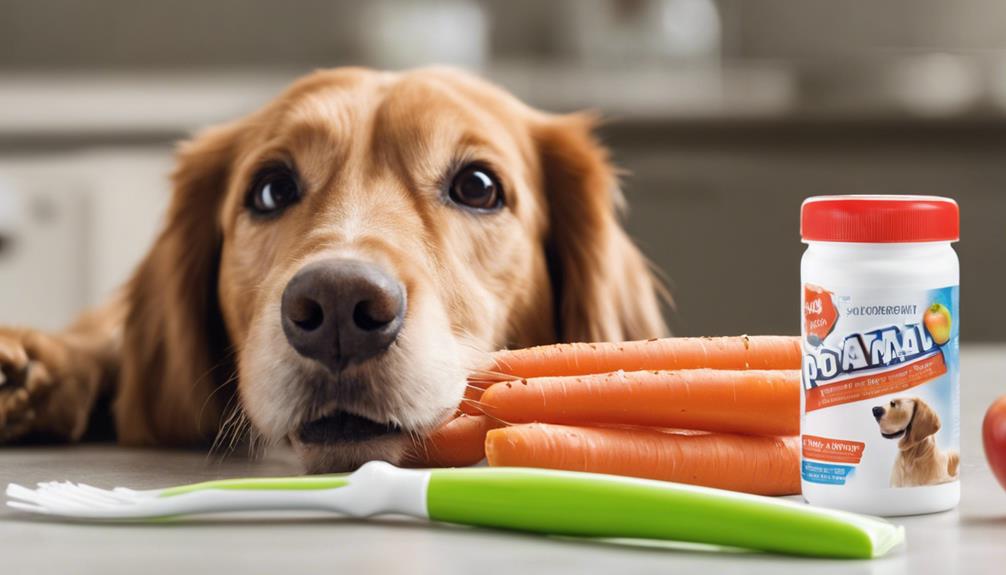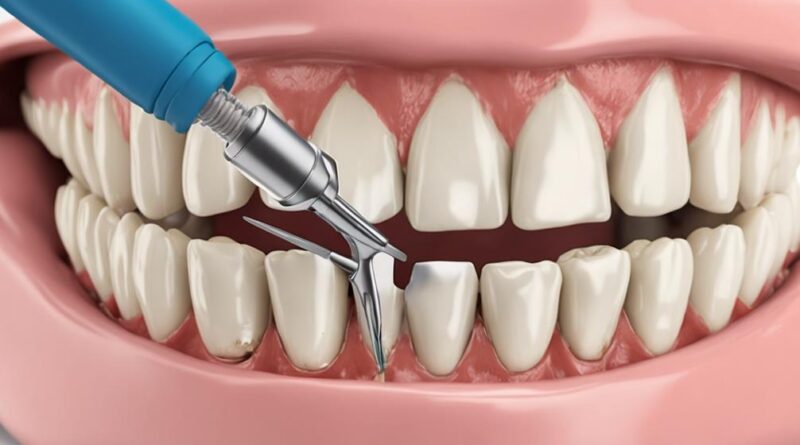Why Are Certain Dog Teeth Cleaning Methods Effective?
Maintaining your furry friend's dental health is crucial, but have you ever wondered why certain dog teeth cleaning methods prove particularly potent?
From brushing to chews, various techniques exist, each with its unique strengths in combating plaque and tartar buildup.
Understanding how these methods work can help you make informed decisions about your pup's oral care.
Explore why some dog teeth cleaning strategies stand out and how they can benefit your canine companion's overall well-being.
Importance of Dog Teeth Cleaning
Regular dog teeth cleaning is crucial for maintaining your furry friend's oral health and overall well-being. By implementing preventative measures like regular brushing and dental check-ups, you can significantly improve your dog's oral health.
Just like humans, dogs can suffer from various dental issues such as plaque buildup, tartar accumulation, and gum disease if their teeth aren't properly cared for. These problems can lead to pain, infection, and even tooth loss, impacting your dog's ability to eat and enjoy life comfortably.
Taking care of your dog's teeth isn't just about preventing bad breath or keeping their smile shiny; it's about ensuring their overall health and quality of life. Poor oral health can also affect other parts of their body, leading to potential heart, kidney, and liver issues.
Therefore, investing time and effort into your dog's dental care routine is a crucial aspect of responsible pet ownership. Remember, a healthy mouth equals a healthy pup!
Types of Dog Teeth Cleaning
Maintaining your dog's oral health involves various methods to ensure their teeth stay clean and healthy. Two effective types of dog teeth cleaning methods are water additives and dental wipes.
Water additives are liquids that you add to your dog's drinking water. These additives contain enzymes or other ingredients that help reduce plaque and tartar buildup in your dog's mouth as they drink. They're easy to use and can be a great addition to your dog's oral care routine.
Dental wipes are another convenient option for keeping your dog's teeth clean. These wipes are designed to be wrapped around your finger for easy application. Gently wipe your dog's teeth and gums with the dental wipes to help remove plaque and freshen their breath. They're particularly useful for dogs that may not tolerate traditional toothbrushing.
Both water additives and dental wipes offer simple yet effective ways to maintain your dog's dental hygiene between regular professional cleanings.
Benefits of Brushing Dog's Teeth
Brushing your dog's teeth regularly helps prevent dental issues and promotes overall oral health. Regular brushing is essential for maintaining your dog's dental health. Just like humans, dogs can develop tartar buildup, leading to gum disease and tooth decay if left unchecked. By incorporating a routine brushing schedule into your dog's care regimen, you can significantly reduce the risk of these problems and ensure good oral hygiene.
Consistent brushing not only prevents tartar buildup but also helps in removing plaque, which can harbor harmful bacteria. This proactive approach minimizes the chances of your dog experiencing painful dental issues that may require costly treatments. Additionally, brushing your dog's teeth allows you to monitor their oral health and catch any abnormalities early on. Making brushing a positive experience for your dog through rewards and praise can also strengthen your bond while taking care of their well-being.
Using Dental Chews for Dogs
Incorporate dental chews as a supplement to your dog's oral care routine to enhance their dental health. Dental chews serve as more than just a tasty treat; they play a vital role in promoting your furry friend's oral hygiene.
Here are some key points to consider when using dental chews for your dog:
- Dietary Supplements: Dental chews can act as dietary supplements, providing additional nutrients that support your dog's overall health.
- Plaque Prevention: Chewing on dental chews helps reduce plaque buildup on your dog's teeth, lowering the risk of dental issues.
- Oral Hygiene: Regular use of dental chews can contribute to better oral hygiene by aiding in the removal of food particles and bacteria.
- Chew Toys: Dogs see dental chews as toys, making them more willing to engage in oral care routines.
- Variety: There's a wide variety of dental chews available, catering to different sizes, breeds, and dental needs of dogs.
Incorporating Dental Sprays
Consider enhancing your dog's oral care routine by incorporating dental sprays as a convenient and effective way to promote their dental health. Dental sprays are designed to target plaque and tartar buildup, helping to maintain your dog's oral hygiene. These sprays can be effective in reducing bacteria in your dog's mouth, which is crucial for preventing dental issues such as tooth decay.
When applying dental sprays, ensure to follow the instructions provided by the manufacturer. Typically, you'd spray the product directly onto your dog's teeth and gums. The spray works by reaching areas that may be difficult to clean with traditional methods, promoting overall dental health in your furry friend.
Regular use of dental sprays can contribute to fresher breath and healthier teeth for your dog. By incorporating dental sprays into your dog's dental care routine, you're taking proactive steps to combat plaque and tartar buildup, ultimately reducing the risk of dental problems down the line.
Professional Dental Cleanings for Dogs
To ensure optimal dental health for your dog, scheduling regular professional dental cleanings is essential. During these cleanings, veterinary professionals perform crucial procedures that help maintain your dog's oral hygiene. Here are key points to consider:
- Dental scaling: This process involves the removal of plaque and tartar from your dog's teeth, preventing periodontal disease.
- Ultrasonic descaling: Ultrasonic scalers use vibrations to break down and remove tough tartar buildup efficiently.
- Expert examination: Veterinarians can identify dental issues early on, preventing potential complications.
- Polishing: After scaling, polishing smoothens the tooth surface, reducing the likelihood of plaque accumulation.
- Treatment recommendations: Professionals can suggest specific dental care products or diets tailored to your dog's needs.
Natural Dog Teeth Cleaning Methods

For effective and gentle maintenance of your dog's dental health, explore natural teeth cleaning methods that can complement professional care. One option is making homemade toothpaste for your furry friend. You can create a simple paste using ingredients like coconut oil, baking soda, and a small amount of cinnamon. These natural elements can help fight bacteria and freshen your dog's breath without any harsh chemicals.
Another way to naturally clean your dog's teeth is by incorporating raw food diets. Raw bones, such as raw meaty bones or recreational bones, can act as a natural toothbrush for your dog. Chewing on these bones helps remove plaque and tartar buildup while also providing essential nutrients for overall dental health.
Establishing a Dental Care Routine
Begin incorporating a consistent dental care routine for your dog to ensure optimal oral health and hygiene. Maintaining good oral health is essential for your furry friend's overall well-being.
Here are some key points to consider:
- Regular Brushing: Brush your dog's teeth at least 2-3 times a week using a dog-specific toothbrush and toothpaste to prevent plaque buildup.
- Dental Chews: Provide dental chews or treats that are designed to promote oral health and help reduce tartar and plaque.
- Professional Check-ups: Schedule regular dental check-ups with your veterinarian to monitor your dog's oral health and address any issues promptly.
- Dental Toys: Invest in dental toys that can help clean your dog's teeth and massage their gums while they play.
- Healthy Diet: Feed your dog a balanced diet that supports good oral health and overall well-being.
Frequently Asked Questions
Can Certain Dog Breeds Require Different Teeth Cleaning Methods Than Others?
When it comes to dog breeds, some may need different teeth cleaning methods than others. Depending on the size, shape, and behavior of different breeds, you might've to adjust your techniques, equipment, or products.
Training your dog to be comfortable with teeth cleaning can help overcome resistance or fear. Understanding the specific needs of your dog's breed can lead to more effective teeth cleaning practices.
Are There Any Potential Risks or Side Effects Associated With Using Dental Chews for Dogs?
When using dental chews for dogs, be aware of potential risks or side effects. Some dogs may experience digestive issues or allergies to certain ingredients.
To avoid these problems, consider chew toy alternatives with natural ingredients. Always monitor your dog while they chew to prevent choking hazards.
How Often Should I Schedule Professional Dental Cleanings for My Dog?
You should schedule regular dental check-ups for your dog to maintain their oral health. Professional cleanings are vital to prevent tartar buildup and gum disease.
The frequency of these cleanings depends on your dog's individual needs, but typically, vets recommend scheduling them once or twice a year. These appointments are crucial for thorough cleanings that can address any underlying issues and keep your dog's teeth and gums healthy.
Are There Any Specific Dietary Recommendations to Promote Better Oral Health in Dogs?
To promote better oral health in dogs, consider incorporating homemade diets and providing dental toys. Homemade diets can be tailored to include ingredients that support dental health, such as crunchy fruits and vegetables.
Dental toys, like chew toys and dental chews, help reduce plaque and tartar buildup. These simple additions to your dog's routine can contribute to maintaining good oral hygiene and preventing dental issues.
What Should I Do if My Dog Resists or Is Afraid of Teeth Cleaning Procedures?
If your dog resists or is afraid of teeth cleaning procedures, start with behavioral training. Use desensitization techniques and positive reinforcement.
Begin by gradually introducing your dog to the toothbrush and toothpaste. Make the experience positive and rewarding.
Take it slow and be patient, allowing your dog to get used to the process at their own pace. Consistency and gentle encouragement will help your dog become more comfortable with teeth cleaning.
Conclusion
Don't underestimate the importance of keeping your dog's teeth clean. Regular brushing, dental chews, sprays, and professional cleanings all play a key role in maintaining your furry friend's dental health.
By incorporating these methods into your routine, you can help prevent dental issues and keep your dog's teeth and gums healthy for years to come.
So, take the time to care for your dog's teeth – they'll thank you with a happy, healthy smile.
